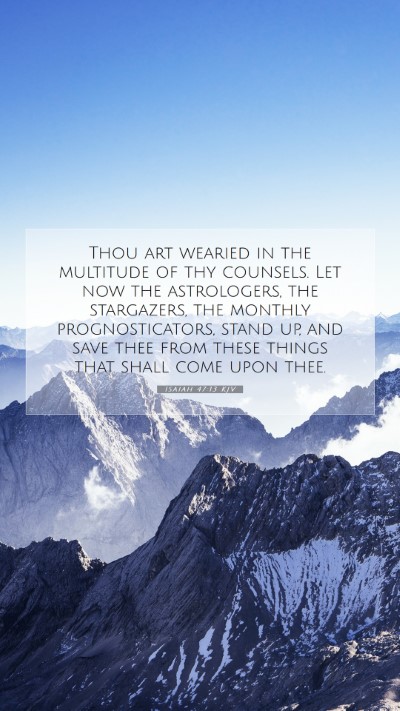Bible Verse Explanation: Isaiah 47:13
Verse: "Thou art wearied in the multitude of thy counsels: let now the astrologers, the stargazers, the monthly prognosticators, stand up, and save thee from these things that shall come upon thee." (Isaiah 47:13)
Comprehensive Bible Verse Meaning
This verse occurs in the context of God's judgment against Babylon. It exemplifies the futility of relying on astrology and other forms of divination instead of trusting in God. The verse illustrates how those who depended on these practices will find themselves helpless when true judgment comes. The insights from various public domain commentaries provide an in-depth understanding of this passage.
Insights from Matthew Henry
Matthew Henry emphasizes the futility of reliance on human wisdom and celestial bodies. He observes that the Babylonians considered themselves wise through their astrology and predictions. However, their wisdom fails in the face of God’s sovereignty. He highlights that while they sought counsel from their astrologers, they would ultimately find no help in the divine judgment that awaited them.
Commentary from Albert Barnes
Albert Barnes, in his commentary, points out how the verse serves as a direct challenge to Babylon’s learned men. He describes how these practitioners of arts cannot avert God’s will. Barnes interprets this verse as a warning against trusting in human wisdom for spiritual and future insights, illustrating that real wisdom comes from God alone.
Exegesis by Adam Clarke
Adam Clarke elaborates on the types of diviners mentioned—astrologers and stargazers—illustrating that they are wholly ineffective in delivering Babylon from its fate. Clarke notes that the repeated mention of weariness indicates the exhaustion of relying on false means of guidance. This highlights a significant theme in scripture about reliance on God versus human or occult practices.
Key Themes and Applications
- Reliance on God: The primary takeaway from this verse is that people should place their trust in God rather than in unreliable sources.
- Encouragement for Believers: Believers are encouraged to seek wisdom from Scripture and prayer rather than from astrology or other misleading practices.
- Judgment and Sovereignty: This passage illustrates the concept of divine judgment and the ultimate sovereignty of God over nations and their practices.
Related Bible Cross References
- Jeremiah 10:2: "Thus saith the LORD, Learn not the way of the heathen, and be not dismayed at the signs of heaven..."
- Isaiah 47:12: "Stand now with thine enchantments, and with the multitude of thy sorceries, wherein thou hast labored from thy youth..."
- Deuteronomy 18:10-12: "There shall not be found among you any one that maketh his son or his daughter to pass through the fire, or that useth divination..."
Conclusion
The study of Isaiah 47:13 provides profound bible verse meanings that are relevant not only to the historical context of Babylon but to contemporary believers. It serves as a reminder of the emptiness of looking to worldly wisdom for matters that ultimately belong to God. By understanding scripture and its implications, individuals can apply these lessons to their own lives, fostering a deeper bible study understanding.
For those involved in Bible study groups or those utilizing bible study tools, this verse exemplifies the importance of looking beyond human understanding and directly to God for guidance, providing a solid foundation for online bible study and personal reflection.


